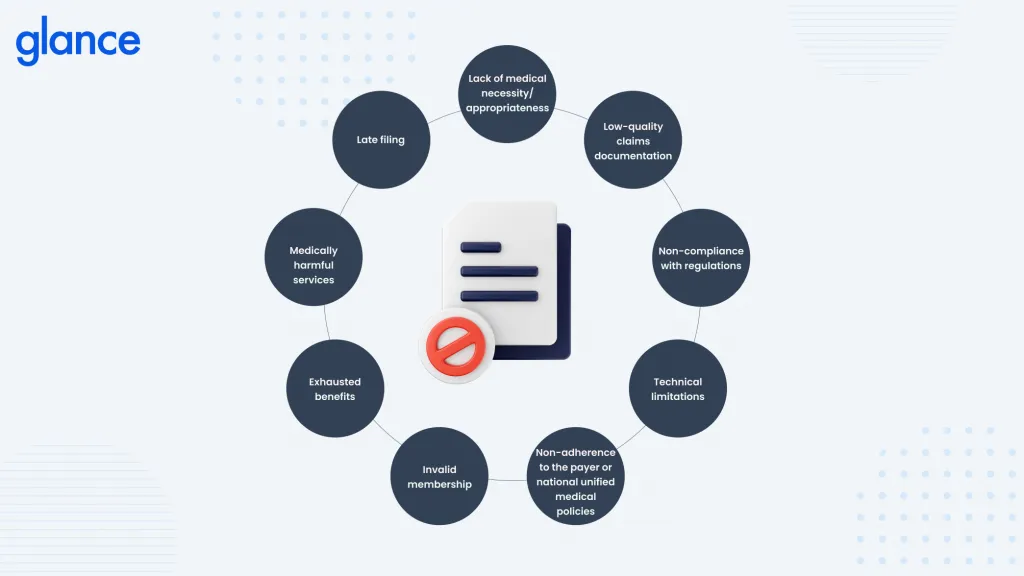In Saudi Arabia, the average healthcare claims rejection rate is around 20% - 25% for small and medium-sized hospitals. This translates to delays and loss of revenue amounting to 3.5 – 4.5 billion SAR every year. This figure is poised to increase further as the healthcare market gears up to increase its market size to 141 billion SAR by 2030.
Getting around the issue of claims rejections requires specialized knowledge of what causes these rejections in the first place. Here are 9 reasons that contribute to the rejection rate for healthcare claims in Saudi Arabia.

Factors Affecting Rejection of Provider Healthcare Claims
1. Lack of Medical Necessity or Appropriateness of Care
Medical necessity adjudication is a complex process, especially in the local market. It is primarily due to the lack of standardized medical documentation and clinical practice guidelines. Ideally, medical claims should serve a well-defined diagnosis/problem as a clear justification. However, most of the local medical practitioners have been trained to rely on exploratory testing to formulate an understanding that has shown to be cost-ineffective—as a result, submitting a claim with an inaccurate or inappropriate diagnosis mostly leads to a denial for excessive or unnecessary service. Using GlanceClaim™ Checker, 40.5% of the analyzed claims lack appropriate justification.
Policyholder Influence
One of the uniquely disruptive factors that affect the medical claim quality is the patient (policyholder) influence on the decision-making. For instance, patients may influence the medical practitioner to gain certain services without a justified medical reason.
2. Low-quality Medical Documentation
In January 2020, the Saudi health council mandated the Australian coding standard for inpatient encounters. However, it has been challenging to implement this change due to insufficient medical coding personnel. We found that 27.8% of the analyzed claims suffered from coding errors.
3. Non-compliance with Regulations
Medical claim filing in Saudi Arabia follows specific standards and requirements appointed by the local regulator, i.e., the Saudi Council of Health Insurance (CHI), to ensure adequate and fair claims processing/reimbursement. Standards include utilizing the unified claim and approval form (UCAF / DCAF 2.0) and the claim’s minimum data set (MDS v3.1). Failure to comply with these requirements jeopardizes the claim’s integrity and fair reimbursement. We found that most of the healthcare providers are not fully compliant. Financial limitations, operational restrictions, and technical immaturity played a major role.
4. Technical Limitations
Accurate transmission of data between stakeholders is one of the most significant challenges in the Saudi market. The reason for this appears to be a lack of standardized data transmission protocols. However, the new regulatory changes adopting the National Platform for Health and Insurance Exchange Services (NPHIES) standards, which are a local modification of HL7-FHIR standards, will significantly improve the market’s technical infrastructure, allowing for greater interoperability and better data exchange. Reflecting on the sampled EHR systems, 2 out of 3 are non-compliant with the minimum data set (MDS v3.1) requirements due to limitations in the system’s data architectural design.
5. Non-adherence to the Payer or National Unified Medical Policies
Contractual terms and policies govern the reimbursement process, which includes pricing, communication standards, pre-approval policies, financial considerations, etc. However, translating these terms into effective processes is operationally challenging, expensive, and potentially restrictive to the workflow. We found that 2.9% of the studied claims lacked adherence to medical policies.
6. Invalid Membership
Payers consider expired subscriptions, invalid relationships, or inaccurate plan details invalid membership. This issue was more prevalent among busy HCPs with poor internal processes. However, NPHIES ensure current and accurate data transmission for instant validation.
7. Consumed and Exhausted Benefits
The policyholder may consume more benefits than the policy allows, which creates a reason for denial. Due to the lack of transparency in information exchange between stakeholders, policyholders may abuse loopholes. Consequently, we found that HCPs rely heavily on requesting pre-authorization to mitigate the risk of claims rejection.
8. Medically Harmful Services
When adjudicating claims, some of the major insurance companies in the Saudi market consider patient safety as a denial measure. For example, prescribing an intravenous antibiotic without proper indicative documentation or co-administering multiple drugs without checking for interaction are the bases for many reimbursement denials. Without appropriate clinical decision support systems, patient safety should remain a valid reason for claims denials in the market.
9. Late Filing
With the overwhelming daily operations, submitting claims on time is one of the HCP’s most stressful tasks. Without supportive workflow, infrastructure, and policies, HCPs continue to trade between claim quality versus timely monthly filing.
How Can Healthcare Providers Increase Claim Approval Rates?
GlanceClaim™ is designed to improve the quality of medical claims by detecting and resolving medical and technical vulnerabilities. This solution has been developed keeping the Saudi healthcare sector in mind and helps 3 key stakeholders of the healthcare-insurance claim cycle – the medical team, the RCM team, and executive management. GlanceClaim™ also reduces coding discrepancies by up to 87%. Read the whitepaper or learn more about GlanceClaim™ here.

